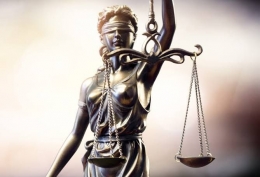The definitive concept of justice is a form of violence. In the law of positivism, justice is approximately predictable and calculable. In the corridor of the positivism, the law of justice also applies a mandatory principle in the enforcement of law. The enforcement of a mandatory law is a form of coercion which leads to an emergence of violence.
According to Jacques Derrida (1930-2004), the assertion of the concept of justice as a conformity with the law must be deconstructed. Derrida shows the reason why the law must be deconstructed. According to him, the law is constructed at the moment of its establishment. Aside of this, our concept of law is affected by the dynamics of human life. The law is for humans, therefore, the law can be deconstructed for the reoccurrence of a profound meaning of justice.
According to Derrida, law can be deconstructed, however, justice cannot be deconstructed. Justice is an impossible experience. This impossibility is indicated by three aporia, such as the epoche regulation, the ghost of undecidability and the urgency in the horizon of knowledge. Due to these three aporia, we cannot elucidate in certainty what justice is.
As an impossible experience, therefore justice is a deconstruction. As a deconstruction, it shows that justice is beyond all forms of conceptualization. It is a mobility. It is never finished. Its appearance is continuously sought after. Justice in other word is a gift where there is no reciprocal relations and principle exchange of concept.
As an impossible experience, it is required for us to continuously seek for justice. This indictment never ends, because justice cannot be equated with anything. Derrida's concept of justice certainly will help in the efforts of enforcement of justice in Indonesia which based its justice system into an order of law.
Pemastian konsep keadilan adalah sebuah bentuk kekerasan. Dalam koridor positivisme hukum, keadilan adalah sesuatu yang dapat diprediksi dan dikalkulasi. Selain hasil dari kalkulasi pasal-pasal, keadilan hukum juga menerapkan prinsip keharusan dalam penegakan hukum. Penegakan hukum atau perintah hukum harus ditegakkan (law must be enforced) merupakan sebuah bentuk pemaksaan yang berujung pada lahirnya kekerasan.
Menurut Jacques Derrida (1930-2004), pemastian konsep keadilan sebagai kesesuaian dengan hukum harus didekonstruksi. Derrida memperlihatkan alasan mengapa hukum harus didekonstruksi. Menurutnya, pada momen pendiriannya, hukum dikonstruksi. Selain karena alasan bahwa hukum dikonstruksi, dinamisme hidup manusia juga ikut memengaruhi gagasan kita tentang hukum. Hukum untuk manusia, maka hukum bisa didekonstruksi untuk mendapatkan kembali makna keadilan.
Menurut Derrida, hukum dapat didekonstruksi, akan tetapi, keadilan tidak dapat didekonstruksi. Keadilan adalah suatu pengalaman yang tidak mungkin. Ketidakmungkinan ini ditandai dengan tiga aporia, yakni epoche peraturan, ketidakterputusan yang menghantui dan kemendesakan dalam horizon pengetahuan. Karena ketiga aporia ini, kita sejatinya tidak dapat menjelaskan secara pasti apa itu keadilan.
Sebagai sebuah pengalaman yang tidak mungkin, maka keadilan menurut Derrida adalah dekonstruksi. Keadilan sebagai dekonstruksi memperlihatkan bahwa keadilan melampaui semua bentuk pengkonsepan. Ia adalah sebuah gerakan. Ia tidak pernah selesai. Ia terus dicari dan ditunggu kedatangannya. Keadilan dengan kata lain adalah sebuah pemberian di mana tidak ada relasi timbal balik dan konsep pertukaran yang mendasarinya.
Sebagai sebuah pengalaman yang tidak mungkin, kita sejatinya dituntut untuk terus menemukan keadilan. Tuntutan ini tidak pernah selesai, karena keadilan tidak bisa diidentikkan dengan apa pun. Ide keadilan Derrida, tentunya akan membantu upaya penegakan keadilan di Indonesia yang selalu mendasarkan keadilan ke dalam tatanan bernama hukum.
Baca konten-konten menarik Kompasiana langsung dari smartphone kamu. Follow channel WhatsApp Kompasiana sekarang di sini: https://whatsapp.com/channel/0029VaYjYaL4Spk7WflFYJ2H







